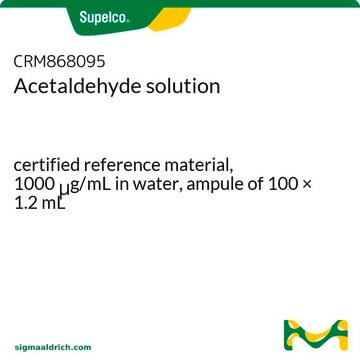About This Item
Halal
Kosher
natural
Recommended Products
grade
FG
Halal
Kosher
natural
Quality Level
reg. compliance
EU Regulation 1334/2008 & 178/2002
FDA 21 CFR 117
vapor density
1.52 (vs air)
vapor pressure
14.63 psi ( 20 °C)
Assay
≥99% (GC)
form
liquid
autoignition temp.
365 °F
expl. lim.
60 %
greener alternative product characteristics
Less Hazardous Chemical Syntheses
Use of Renewable Feedstocks
Learn more about the Principles of Green Chemistry.
sustainability
Greener Alternative Product
refractive index
n20/D 1.332 (lit.)
pH
5 (20 °C)
bp
21 °C (lit.)
mp
−125 °C (lit.)
density
0.785 g/mL at 25 °C (lit.)
application(s)
flavors and fragrances
Documentation
see Safety & Documentation for available documents
food allergen
no known allergens
greener alternative category
Organoleptic
ethereal
storage temp.
2-8°C
SMILES string
CC=O
InChI
1S/C2H4O/c1-2-3/h2H,1H3
InChI key
IKHGUXGNUITLKF-UHFFFAOYSA-N
Looking for similar products? Visit Product Comparison Guide
General description
Application
- Identification of acetaldehyde based on plasmonic patterns of a gold nanostructure conjugated with chromophore and H(2)O(2): a new platform for the rapid and low-cost analysis of carcinogenic agents by colorimetric affordable test strip (CATS).: This study presents a novel method for detecting acetaldehyde using gold nanostructures, offering a fast, affordable solution for monitoring this carcinogenic compound (Shadjou N et al., 2024).
- Optimisation and characterisation of KOH-activated carbon obtained from Baijiu spent grains for the mitigation of risk factors in alcoholic beverages.: This paper explores the use of KOH-activated carbon for absorbing acetaldehyde from alcoholic beverages, reducing its carcinogenic risk (Sun B et al., 2024).
- Single-site iron-anchored amyloid hydrogels as catalytic platforms for alcohol detoxification.: Discusses the development of novel iron-anchored amyloid hydrogels that catalyze the breakdown of acetaldehyde, a harmful metabolite of alcohol (Mezzenga R et al., 2024).
Caution
Signal Word
Danger
Hazard Statements
Precautionary Statements
Hazard Classifications
Carc. 1B - Eye Irrit. 2 - Flam. Liq. 1 - Muta. 2 - STOT SE 3
Target Organs
Respiratory system
Storage Class Code
3 - Flammable liquids
WGK
WGK 3
Flash Point(F)
-38.0 °F - closed cup
Flash Point(C)
-38.89 °C - closed cup
Personal Protective Equipment
Regulatory Listings
Regulatory Listings are mainly provided for chemical products. Only limited information can be provided here for non-chemical products. No entry means none of the components are listed. It is the user’s obligation to ensure the safe and legal use of the product.
PRTR
Specified Class I Designated Chemical Substances
FSL
Group 4: Flammable liquids
Special flammables
Hazardous rank I
ISHL Indicated Name
Substances Subject to be Indicated Names
ISHL Notified Names
Substances Subject to be Notified Names
JAN Code
W200336-400G:
W200336-12KG:
W200336-2KG-K:
W200336-12KG-K:4548174014486
W200336-VAR:
W200336-1.9KG-K:4548174014479
W200336-PZ:
W200336-2KG:
W200336-SAMPLE-K:
W200336-16.5KG-K:4548174014493
W200336-15KG-K:
W200336-BULK:
W200336-SAMPLE:
W200336-BULK-K:
W200336-VAR-K:
W200336-400G-K:4548174014509
Choose from one of the most recent versions:
Already Own This Product?
Find documentation for the products that you have recently purchased in the Document Library.
Customers Also Viewed
Our team of scientists has experience in all areas of research including Life Science, Material Science, Chemical Synthesis, Chromatography, Analytical and many others.
Contact Technical Service





